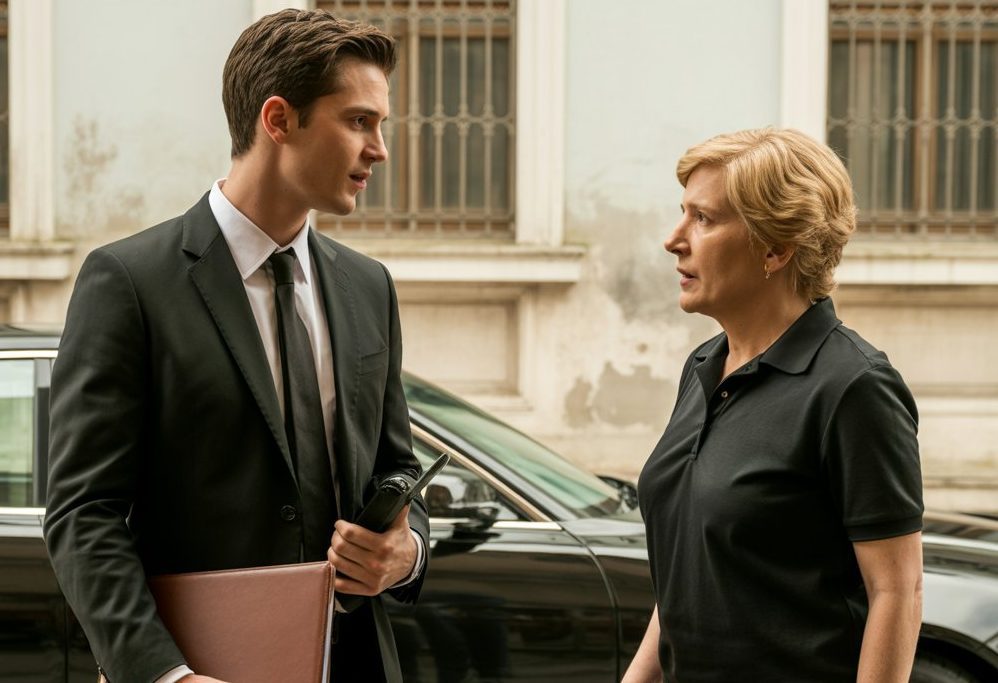The atmosphere in the room was so heavy that even the faint ticking of the old wall clock seemed amplified. María eyed the sharply dressed young man with suspicion, attempting to identify the child he mentioned in his recollection. Taking a deep breath as if about to unveil a long-buried chapter of his past, he began to speak.
“I was eight years old,” he started. “It was a cold December night, raining heavily, the chill biting into our bones. My sister and I hadn’t eaten for two days. Barefoot and soaked to the skin, we walked past the restaurant where you worked. The aroma of beans and rice intoxicated us with hunger.”
María pressed her lips tightly together. Memories of countless nights spent working there flooded her mind—customers arriving, laughter, occasional arguments. But also, she recalled the gaunt faces peering through the window—frail children with enormous eyes, silently pleading.
“You noticed us through the glass,” he continued, his voice trembling. “You left through the back door, beckoned us with a gesture, and handed us two hot plates wrapped in napkins to keep them warm. ‘Eat slowly, there’s more if you need it,’ you said.”
María covered her mouth with her hand.
“My goodness…”
“Then, you gave us two pieces of bread, wrapped in paper. You had no obligation to do so. Everyone else ignored us that night, but you were the only one who saw us as human beings.”
The young man swallowed hard; his eyes shimmered with restrained emotion.
“That dinner saved my life. It was the first ray of hope I ever had.”
“My name is Santiago Ramírez,” he finally revealed. “My mother had passed away months before, and my father… well, he abandoned us. Shortly after that night, my younger sister and I ended up in an orphanage.”
María listened quietly, her heart tightening painfully.
“Life was tough,” he continued. “Hunger, abuse, humiliation—but whenever I thought that life was worthless, I remembered that meal. I told myself, ‘Somewhere out there, someone believes I deserve to live.’ That thought kept me going.”
The leather folder trembled in his hands.
“I studied thanks to scholarships and worked any job I could find. I cleaned restrooms, sold sweets on buses, carried heavy loads at the market. With every small victory, I thought, ‘I owe this to the tired-eyed woman who gave me bread.’”
Tears welled up in María’s eyes.
“I graduated as an engineer and founded a software company three years ago that now has international investors. And all, absolutely all, started with that simple dinner.”
Santiago placed a thick envelope on the table.
“This contains enough money to ensure you never have to worry about rent, debts, or medicine again. It’s yours.”
María looked at him, trembling.
“No, my son. I cannot accept this. What I did was… something anyone would have done.”
“No, ma’am,” he answered firmly. “Not just anyone would have done what you did. You gave us the little you had without expecting anything in return. You don’t realize what it meant to me. This envelope isn’t payment—it’s gratitude.”
María shook her head, sobbing softly.
“One dinner doesn’t change a life.”
Santiago smiled gently.
“When hunger for hope exists, a single meal can change everything.”
At that moment, the door opened, and a young woman with dark hair entered. She wore modest clothing, yet her eyes mirrored Santiago’s.
“This is Valeria, my sister,” he said.
The young woman rushed to embrace María tightly.
“Thank you for not letting us starve that night,” she whispered through tears. “Thank you for reminding us that kindness still exists.”
Deeply moved, María hugged them as if they were her own children.
Amid tears and freshly brewed coffee, María shared her own story:
- She too was an orphan, raised without a mother and with an alcoholic father.
- Since age thirteen, she had labored in kitchens, scrubbing floors and enduring insults.
- On many occasions, hunger was her unwelcome companion.
- Seeing the siblings that night was like looking back at herself as a child.
The trio fell into a contemplative silence, sensing that destiny’s threads had intertwined invisibly.
Hours passed in conversation. Santiago and Valeria insisted María accept the envelope. Eventually, with unsteady hands, she took it.
“Very well,” she said. “But promise me this: never forget where you came from. Always help those in need.”
Santiago nodded, his eyes shining with resolve.
“I made that vow the very night you saved us. And if ever I could, I pledged to save others.”
In the following months, Santiago not only refurbished María’s humble home; he built her a spacious, comfortable, sunlit new house. More importantly, he visited her weekly, bringing flowers and sharing conversations as though he had always been her son.
María was no longer the invisible waitress from a downtown restaurant. She had become the mother reclaimed by two orphans through a simple, yet everlasting, act of kindness.
This story spread throughout Medellín. Many would say, “A meal doesn’t change the world.” But for Santiago and Valeria, a warm meal transformed everything.
Each time María saw them arrive in that black Mercedes-Benz, with genuine smiles and open arms, she understood life’s profound lesson: no act of kindness is ever too small when it is heartfelt.
Ultimately, this poignant reunion highlights the tremendous impact even the smallest gestures can have on human lives. It reminds us that compassion and generosity sow seeds that can blossom into hope and transformation, shining brightly through the darkest moments.
